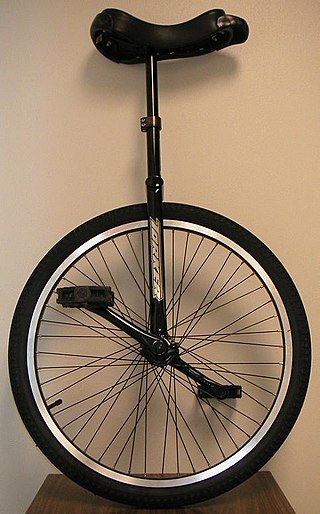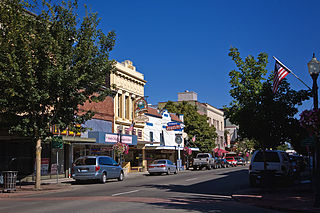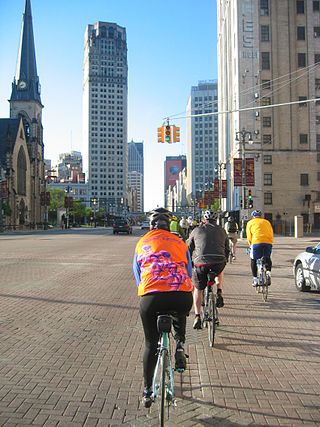Related Research Articles

A unicycle is a vehicle that touches the ground with only one wheel. The most common variation has a frame with a saddle, and has a pedal-driven direct-drive. A two speed hub is commercially available for faster unicycling. Unicycling is practiced professionally in circuses, by street performers, in festivals, and as a hobby. Unicycles have also been used to create new sports such as unicycle hockey. In recent years, unicycles have also been used in mountain unicycling, an activity similar to mountain biking or trials.

Lewis County is a county in the U.S. state of Washington. As of the 2020 census, the county's population was 82,149. The county seat is Chehalis, and its largest city is Centralia. Lewis County comprises the Centralia, WA Micropolitan Statistical Area, which is also included in the Seattle-Tacoma, WA Combined Statistical Area.

Centralia is a city in Lewis County, Washington, United States. It is located along Interstate 5 near the midpoint between Seattle and Portland, Oregon. The city had a population of 18,183 at the 2020 census. Centralia is twinned with Chehalis, located to the south near the confluence of the Chehalis and Newaukum rivers.

Chehalis is a city in and the county seat of Lewis County, Washington, United States. The population was 7,439 at the time of the 2020 census.

Critical Mass is a form of direct action in which people travel as a group on bicycles at a set location and time. The idea is for people to group together to make it safe for each other to ride bicycles through their streets, based on the old adage: there's safety in numbers.

The penny-farthing, also known as a high wheel, high wheeler or ordinary, is an early type of bicycle. It was popular in the 1870s and 1880s, with its large front wheel providing high speeds, owing to it travelling a large distance for every rotation of the legs, and comfort, because the large wheel provided greater shock absorption.

Zoobomb is a weekly bicycling activity in Portland, Oregon, United States during which participants ride bicycles rapidly downhill in the city's West Hills. Zoobomb began in 2002.

Like transportation in the rest of the United States, the primary mode of local transportation in Portland, Oregon is the automobile. Metro, the metropolitan area's regional government, has a regional master plan in which transit-oriented development plays a major role. This approach, part of the new urbanism, promotes mixed-use and high-density development around light rail stops and transit centers, and the investment of the metropolitan area's share of federal tax dollars into multiple modes of transportation. In the United States, this focus is atypical in an era when automobile use led many areas to neglect their core cities in favor of development along interstate highways, in suburbs, and satellite cities.
Portland is "an international pioneer in transit orientated developments."

Since the advent of the bicycle in the 1860s, Chicago has been distinguished as one of the premier cycling locations in the United States, with such public cycling destinations as Grant Park, Burnham Park and the Chicago Park District's Lakefront Trail.

The Chehalis–Centralia Railroad (CHTX) is a heritage railroad based in Chehalis, Washington.

The Marvin Braude Bike Trail is a 22-mile (35 km) paved bicycle path that runs mostly along the shoreline of Santa Monica Bay in Los Angeles County, California. The coastal bike trail is widely acknowledged as Los Angeles’ “most popular bike path.”

The World Naked Bike Ride (WNBR) is an international clothing-optional bike ride in which participants plan, meet and ride together en masse on human-powered transport, to "deliver a vision of a cleaner, safer, body-positive world." The first ride happened in Zaragoza (Spain) in 2001.

Ride Around Mount Rainier in One Day (RAMROD) is an annual bicycle ride on a 154-mile (248 km) course around Mount Rainier National Park in the U.S. state of Washington. The course uses several highways and roads around the park and features approximately 10,000 feet (3,000 m) of elevation gain over two mountain passes. The ride is held on the last Thursday of July and has been organized by the Redmond Cycling Club since it began in 1984.

The Cascade Bicycle Club is a nonprofit 501(c)(3) 91-2165219 community organization based in Seattle, Washington in the United States. It is the largest statewide bicycling nonprofit in the United States with more than 8,900 members. It is run by a volunteer board of directors, 28 professional staff, and more than 250 volunteers.

The Chehalis Western Trail is a rail trail in Thurston County, Washington and is the longest shared-use path in the region. It occupies an abandoned railroad corridor that was once used by the historic Weyerhaeuser-owned Chehalis Western Railroad. The rail line was converted to a bicycle and walking trail and intersects with the 14.5-mile (23.3 km) Yelm-Rainier-Tenino Trail and the 4.7-mile (7.6 km) Karen Fraser Woodland Trail.
The Yelm–Rainier–Tenino Trail, formerly the Yelm–Tenino Trail, is a rail trail located in Thurston County, Washington, United States.

Detroit is a popular city for cycling. It is flat with an extensive road network with a number of recreational and competitive opportunities and is, according to cycling advocate David Byrne, one of the top eight biking cities in the world. The city has invested in greenways and bike lanes and other bicycle-friendly infrastructure. Bike rental is available from the riverfront and tours of the city's architecture can be booked.

A century ride is a road cycling ride of 100 kilometers or more in metric system countries or 100 miles or more in imperial system countries, usually as a cycling club-sponsored event. Many cycling clubs sponsor an annual century ride as both a social event for cyclists and as a fund-raiser for the club’s other activities.

Micromobility refers to a range of small, lightweight vehicles, driven by users personally. Micromobility devices include bicycles, e-bikes, electric scooters, electric skateboards, shared bicycle fleets, and electric pedal assisted (pedelec) bicycles.
References
- ↑ "Cascade Bicycle Club History" . Retrieved 2016-06-10.
- ↑ "Seattle to Portland (STP) Frequently Asked Questions". Cascade Bicycle Club . Retrieved 2019-07-15.
- ↑ "Group Health Seattle to Portland: Frequently Asked Question". Cascade Bicycle Club . Retrieved 2006-05-21.
- 1 2 3 4 "Group Health Seattle to Portland: Ride Information & Description". Cascade Bicycle Club . Retrieved 2006-05-21.
- 1 2 The Chronicle staff (January 19, 2022). "Centralia-Chehalis-Chamber: Community Support Sought in Seattle to Portland Bike Ride's Return". The Chronicle. Retrieved August 17, 2023.
- ↑ "STP Midpoint at Centralia College". Archived from the original on 2015-07-13. Retrieved 2015-07-13.
- 1 2 Bain, Lara (2005-07-09). "Fueling up for Seattle-to-Portland bicycle classic". The Seattle Times . Retrieved 2006-05-21.
- ↑ "STP Ride Details". Archived from the original on 2020-09-19.
- ↑ Horowitz, Joanna (2004-07-16). "Bike event rides into 25th year". The Seattle Times . Retrieved 2006-05-21.
- 1 2 Mike Lewis; Kristen Millares Bolt (2007-07-15). "Suspect arrested in STP biking marathon collision". Seattle Post-Intelligencer . Retrieved 2007-07-16.
- ↑ Nokkentved, N.S. (2002-07-09). "Teen will ride unicycle in STP". The Olympian .
- ↑ "Paul Otto Wantzelius, 1949-2010". 30 October 2010.
- ↑ Lindblom, Mike (September 14, 2015). "Legendary NW Bicyclist Jerry Baker, 73, dies". Seattle Times .
- ↑ "About the Ride From Seattle To Vancouver, BC & Party: History". Cascade Bicycle Club . Retrieved 2006-05-21.